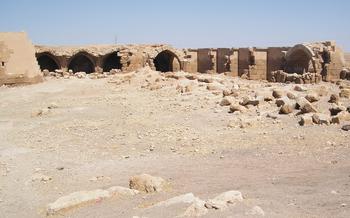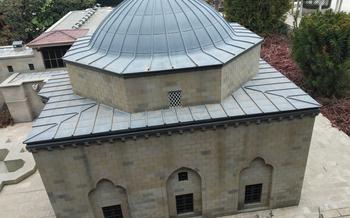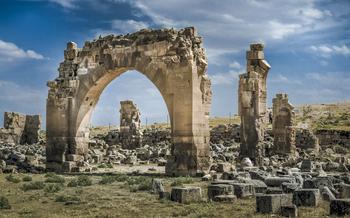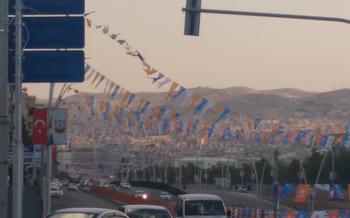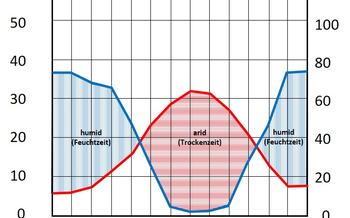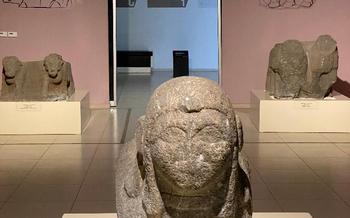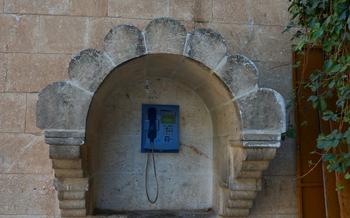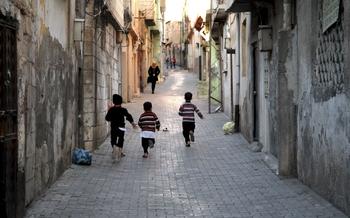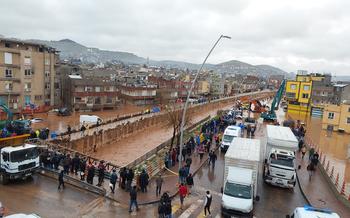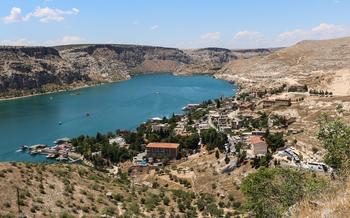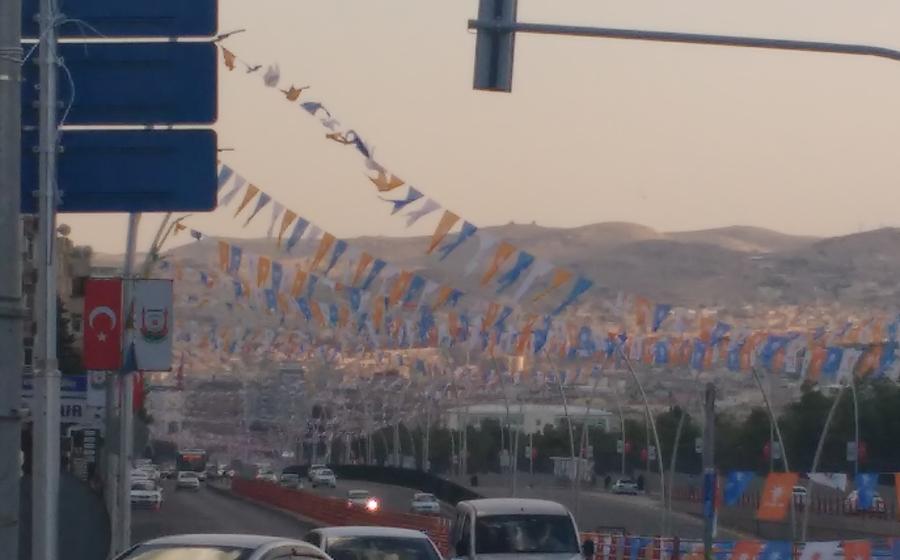
House of the Prophet Job (Eyyüp Peygamber Sabır Makamı)
- A Prophet's Abode: The House of the Prophet Job
- In the Footsteps of Faith: A Pilgrimage to the Prophet's Abode
- Architectural Marvels: Exploring the Prophet's House
- A Place of Worship: The Mosque of the Prophet Job
- The Well of Job: A Source of Healing and Blessings
- Local Delights: Savoring Şanlıurfa's Cuisine
- Handicrafts and Souvenirs: Treasures to Take Home
- Transportation Tips: Getting Around Şanlıurfa
- Planning Your Visit: Tips for a Smooth Journey
- Exploring Nearby Attractions: Beyond the Prophet's Abode
- Respecting Local Customs and Traditions: A Guide for Visitors
- Capturing Memories: Photography Tips for Your Journey
- Insider Tip: Unveiling a Hidden Gem
A Prophet's Abode: The House of the Prophet Job
In the heart of the ancient city of Şanlıurfa lies a sacred site that holds immense historical and religious significance – the House of the Prophet Job (Eyyüp Peygamber Sabır Makamı). This revered abode is believed to be the very spot where the Prophet Job, a figure of unwavering patience and resilience, once lived and endured trials sent by God.
The House of the Prophet Job serves as a testament to the enduring legacy of this revered figure. Its very existence carries a profound spiritual weight, inviting pilgrims and visitors alike to explore the life and teachings of the prophet who exemplifies the virtue of patience in the face of adversity.
Visiting the House of the Prophet Job is not merely a historical or religious pursuit but a journey into the realm of faith and perseverance. It is an opportunity to connect with the enduring legacy of a prophet whose trials and triumphs continue to inspire generations.
In the Footsteps of Faith: A Pilgrimage to the Prophet's Abode
The House of the Prophet Job, known as Eyyüp Peygamber Sabır Makamı in Turkish, holds immense religious significance for pilgrims from around the world. For centuries, devout travelers have journeyed to this sacred site to pay homage to the Prophet Job and seek blessings.
According to Islamic tradition, the Prophet Job (Eyyüp) was a man of great patience and faith who endured numerous trials and tribulations throughout his life. He is revered for his unwavering devotion to God and his ability to overcome adversity with patience and resilience. His story, as recounted in the Quran, serves as a source of inspiration and guidance for Muslims worldwide.
Visiting the House of the Prophet Job is considered a pilgrimage, a journey of spiritual significance and self-discovery. Pilgrims come from far and wide to seek blessings, pray for guidance, and connect with the spirit of the prophet. The site is particularly popular during religious holidays and festivals, when thousands of pilgrims gather to pay their respects and participate in special ceremonies and rituals.
The pilgrimage to the House of the Prophet Job offers a profound spiritual connection for many believers. It is a time for reflection, contemplation, and renewal of faith. Pilgrims often spend hours in prayer and meditation, seeking solace and guidance from the prophet. The experience of visiting this sacred site leaves a lasting impression on many pilgrims, who return home with a renewed sense of purpose and a deeper connection to their faith.
Architectural Marvels: Exploring the Prophet's House
The House of the Prophet Job is not just a religious site; it is also an architectural marvel that showcases unique and distinctive features. The building's exterior is adorned with intricate carvings and inscriptions that tell the story of the prophet's life and his unwavering patience. Inside, visitors can admire the well-preserved frescoes and murals that vividly depict scenes from the prophet's trials and tribulations.
The house has undergone extensive restoration and renovation projects over the years, ensuring its preservation for future generations. These projects have been meticulously carried out to maintain the building's original character and historical integrity. The result is a harmonious blend of ancient craftsmanship and modern conservation techniques that allows visitors to experience the site's historical significance in all its glory.
Beyond its religious and historical importance, the House of the Prophet Job is also a testament to the region's rich architectural heritage. The unique blend of Islamic and Byzantine architectural styles creates a visually stunning masterpiece that is sure to captivate visitors from all walks of life. From its grand entrance to its intricate details, every aspect of the building's design has been carefully considered to reflect the prophet's story and the enduring legacy of his faith.
A Place of Worship: The Mosque of the Prophet Job
The Mosque of the Prophet Job, an architectural masterpiece, stands adjacent to the House of the Prophet Job, forming a sacred complex of religious significance. The mosque, revered by Muslims in the region, serves as a place of worship and spiritual reflection. Its unique architectural features, including intricate tilework, elegant arches, and a serene courtyard, create a mesmerizing ambiance that invites tranquility and contemplation.
Built in the 13th century during the Ayyubid dynasty, the mosque has undergone several renovations and expansions over the centuries, each contributing to its architectural richness. The main prayer hall, adorned with intricate calligraphy and colorful stained-glass windows, exudes an aura of spirituality that captivates visitors. Devotees from near and far gather here to offer their prayers, seeking blessings and guidance from the Almighty.
The mosque's historical context is deeply intertwined with the life of the Prophet Job. According to Islamic tradition, the Prophet Job, known for his unwavering patience and resilience, spent a significant period of his life in Şanlıurfa. The mosque, situated near the believed location of his dwelling, holds immense religious significance for pilgrims and visitors alike.
Stepping into the Mosque of the Prophet Job is a journey through time and faith. The serene atmosphere, coupled with the mosque's architectural grandeur, creates a spiritual haven that invites visitors to connect with their inner selves and seek divine guidance. The mosque stands as a testament to the region's rich spiritual heritage and continues to serve as a beacon of faith for generations to come.
The Well of Job: A Source of Healing and Blessings
The Well of Job, also known as the Well of Patience, is a revered site within the complex of the House of the Prophet Job. According to local tradition and Islamic scriptures, this well is believed to possess healing properties and is associated with the Prophet Job's trials and tribulations. Visitors to the site often engage in rituals and traditions related to the well, such as drinking its water for healing or performing ablutions before prayer. The well's symbolic significance extends beyond its physical form, representing Job's unwavering faith and the divine blessings bestowed upon him after his trials. Accessibility to the well is provided within the complex, allowing pilgrims and visitors to experience its spiritual significance firsthand.
Local Delights: Savoring Şanlıurfa's Cuisine
Şanlıurfa's cuisine is a culinary journey that tantalizes the taste buds with its unique flavors and aromatic spices. The city is renowned for its delectable kebabs, which are grilled to perfection and infused with a blend of herbs and spices that create an explosion of flavors.
One of the must-try dishes is the Şanlıurfa kebabı, a succulent lamb kebab that is cooked over an open fire and served with grilled vegetables and a drizzle of tangy sauce. Another local specialty is the lahmacun, a thin and crispy flatbread topped with minced meat, vegetables, and herbs, baked in a traditional stone oven.
For those with a sweet tooth, Şanlıurfa künefe is a must-indulge. This traditional dessert is made with shredded phyllo dough, filled with sweet cheese, and topped with a layer of crispy, golden-brown dough, drenched in a sweet syrup.
Şanlıurfa's culinary heritage is deeply rooted in its history and culture. The city's strategic location, as a crossroads of trade routes, has influenced its cuisine, resulting in a diverse blend of flavors from different regions.
To fully immerse yourself in the local culinary experience, visit the bustling local markets, such as the Gümrük Han, where you can find fresh produce, spices, and traditional sweets. Here, you can interact with friendly vendors and learn about the ingredients and cooking techniques used in Şanlıurfa's cuisine.
Whether you're a food enthusiast or simply looking for a taste of authentic Turkish cuisine, Şanlıurfa's culinary delights will leave you with lasting memories and a deep appreciation for the city's rich culinary heritage.
Handicrafts and Souvenirs: Treasures to Take Home
Şanlıurfa is a treasure trove of unique handicrafts and souvenirs that reflect its rich cultural heritage. From intricate copperware to colorful textiles, there's something for every taste and budget. Explore the vibrant local markets to discover handmade carpets, pottery, and jewelry, each piece a testament to the skill and artistry of local artisans.
Stroll through the narrow streets of the old city and bargain with friendly vendors for the best prices. Don't miss the opportunity to support local artisans by purchasing their handcrafted goods, helping to preserve traditional crafts and ensure the continuation of these valuable skills. Take home a piece of Şanlıurfa's charm and history, whether it's a decorative ceramic plate, a delicate woven scarf, or a gleaming copper tray. Your souvenirs will serve as cherished reminders of your time in this vibrant and welcoming city.
Transportation Tips: Getting Around Şanlıurfa
Airport Information
Şanlıurfa Airport (GNY) is the main gateway to the city. It is located approximately 30 kilometers from the city center. Several airlines offer direct flights to Şanlıurfa from major cities in Turkey, as well as from some international destinations. Upon arrival at the airport, you can take a taxi or rent a car to reach your accommodation or desired destination.
Local Transportation
Şanlıurfa has a well-developed public transportation system that includes buses, minibuses, and taxis. Buses and minibuses are affordable and widely accessible, connecting different parts of the city. Taxis are also readily available and offer a convenient mode of transportation, but they can be more expensive than public transportation.
Renting a Car
If you prefer the flexibility of exploring the region at your own pace, consider renting a car. Several car rental agencies operate at the airport and in the city center. Renting a car allows you to visit nearby attractions and explore the surrounding countryside at your leisure. Keep in mind that driving in Turkey can be challenging, especially in busy urban areas.
Guided Tours
For a hassle-free and informative experience, consider joining a guided tour. Many tour operators offer day trips and multi-day tours that include visits to the House of the Prophet Job and other attractions in the region. Guided tours provide the advantage of having a knowledgeable guide who can share historical insights and cultural context.
Planning Your Visit: Tips for a Smooth Journey
Before embarking on your journey to Şanlıurfa, it's essential to plan your trip meticulously to ensure a smooth and enjoyable experience. Here are some valuable tips to help you plan your visit:
Best time to visit: Şanlıurfa's climate is characterized by hot and dry summers and mild winters. The ideal time to visit is during the shoulder seasons (spring and autumn) when the weather is pleasant and the crowds are smaller.
Visa requirements: Citizens of many countries require a visa to enter Turkey. Check with your local Turkish embassy or consulate to determine if you need a visa and the necessary steps to obtain one.
Packing essentials: Pack light, comfortable clothing that is suitable for the weather conditions. Don't forget to bring a hat, sunglasses, and sunscreen to protect yourself from the sun. Comfortable walking shoes are a must, as you'll be doing a lot of walking to explore the city's attractions.
Safety tips: Şanlıurfa is generally a safe city, but it's essential to take precautions as you would in any foreign destination. Avoid walking alone at night, be aware of your surroundings, and keep your valuables safe.
Exploring Nearby Attractions: Beyond the Prophet's Abode
In addition to the House of the Prophet Job, Şanlıurfa offers a wealth of other captivating attractions that showcase its rich history, natural beauty, and vibrant culture. Immerse yourself in the region's storied past by visiting historical sites like the ancient city of Harran, with its iconic beehive-shaped houses, and the Göbekli Tepe archaeological site, home to some of the world's oldest known temples.
Venture beyond the city limits to discover breathtaking natural wonders such as the Halfeti Village, a picturesque town nestled amidst lush pistachio groves, and the Birecik Bridge, an architectural marvel spanning the Euphrates River. For a truly immersive experience, embark on a day trip to nearby towns and villages, where you can witness traditional crafts, savor local delicacies, and connect with the warm and welcoming people of Şanlıurfa.
Şanlıurfa's cultural tapestry comes alive during its vibrant festivals and events. Don't miss the chance to witness the Şanlıurfa Zeugma Mosaic Festival, a celebration of the city's rich artistic heritage, or the Şanlıurfa Pistachio Festival, a culinary extravaganza showcasing the region's prized pistachio nuts. Immerse yourself in the infectious energy of these joyous gatherings and gain a deeper appreciation for Şanlıurfa's unique cultural identity.
Respecting Local Customs and Traditions: A Guide for Visitors
When traveling to Şanlıurfa, it's essential to be respectful of local customs and traditions to ensure a smooth and enjoyable experience. Here are some guidelines to keep in mind:
Dress Code:
- Conservative Attire: Dress modestly and avoid revealing clothing, especially when visiting religious sites.
- Head Coverings: Women may choose to cover their heads with a scarf as a sign of respect in certain settings.
Social Etiquette:
- Greetings: Greet people with a handshake or a nod, accompanied by a friendly "Merhaba" (hello).
- Body Language: Be mindful of your body language and avoid public displays of affection.
- Personal Space: Respect personal space and maintain a comfortable distance during conversations.
Religious Customs:
- Prayer Times: Be aware of prayer times and avoid disturbing religious activities.
- Mosque Etiquette: Remove your shoes before entering a mosque and dress appropriately.
- Ramadan: During the holy month of Ramadan, respect fasting hours and avoid eating or drinking in public.
Taboos:
- Swearing: Avoid using profanity or offensive language.
- Politics and Religion: Be cautious when discussing politics or religion, as these topics can be sensitive.
- Photography: Ask permission before taking photos of people, especially women.
By respecting local customs and traditions, you can show your appreciation for the culture and create a positive experience for yourself and those around you.
Capturing Memories: Photography Tips for Your Journey
Camera recommendations:
Whether you're a seasoned photographer or just starting out, having the right camera equipment can make a big difference in capturing stunning travel photos. For beginners, a compact camera or a smartphone with a good camera can be a great option, as they're easy to carry around and use. If you're more experienced, a DSLR or mirrorless camera will give you more control over your settings and allow you to capture higher-quality images.
Composition techniques:
Composition is key to creating visually appealing photographs. Experiment with different angles, perspectives, and framing to create dynamic and interesting shots. Use leading lines, the rule of thirds, and negative space to guide the viewer's eye through your image.
Lighting conditions:
Lighting can make or break your travel photos. Learn to work with different lighting conditions, from harsh sunlight to soft, diffused light. Golden hour, just after sunrise or before sunset, is often considered the best time to take photos due to its warm, flattering light.
Editing tips:
Even the best photos can benefit from a little editing. Use photo editing software to adjust exposure, contrast, and white balance, and to remove unwanted objects or distractions. Simple editing techniques can help you enhance your travel photos and make them pop.
Insider Tip: Unveiling a Hidden Gem
Venture beyond the well-trodden tourist trail and uncover the hidden gem of the Şanlıurfa Museum. This treasure trove of history and culture houses an impressive collection of artifacts that shed light on the region's rich past. Gaze in awe at intricate mosaics, marvel at ancient pottery, and discover the secrets of extinct civilizations that once thrived in this land. Immerse yourself in the captivating stories told by these relics and gain a deeper understanding of the region's cultural heritage.
Engage with the friendly locals, who are always eager to share their insights and recommendations. They can point you towards hidden culinary gems, guide you to off-the-beaten-path attractions, and share fascinating tales that bring the city's history to life. Embrace the opportunity to connect with the local community and gain a glimpse into their way of life.
For those seeking a truly immersive experience, consider venturing out on a day trip to the nearby village of Harran. This ancient settlement, steeped in history and tradition, offers a glimpse into a bygone era. Explore the unique beehive-shaped houses, a testament to the ingenuity of past generations, and immerse yourself in the vibrant local culture. Discover the secrets of traditional crafts, savor the flavors of authentic dishes, and create memories that will last a lifetime.
